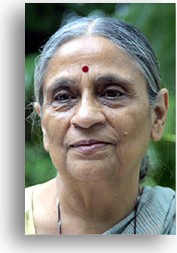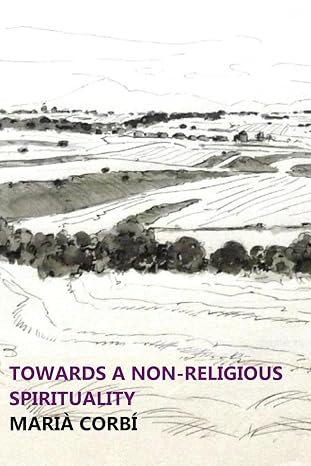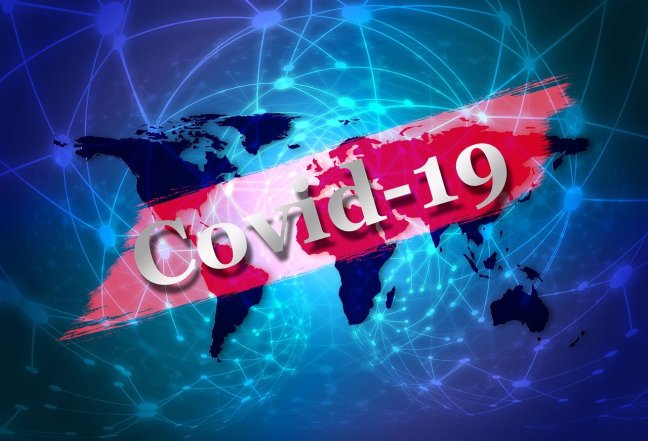We are facing one of the most profound periods of change in human history. This mutation is forcing us to be aware that we have to construct our systems and ways of life for ourselves, while rapid and frequent changes occur in our societies of continuous innovation. To be able to guide our future, we must investigate what is happening, as well as the consequences arising – in all fields of our life – from the economic, social, cultural and religious events that are taking place before our eyes. We have to study what is occurring in our societies in order to calibrate what is happening to the language of the religious traditions of the past and their age-old legacy. Attributing the crisis in religion to the breakdown of culture is one way of evading the serious problem. The cause of this situation has been the general evolution of culture and its consequences.
Questions mold our lives
Kennedy School of Government Commencement Speech given by Ela Bhatt .
7 June 2006
Source: www.wiego.org.
More about Ela Bhatt: http://theelders.org/ela-bhatt
Congratulations! Thank you for inviting me today. Looking at this sea of bright, intelligent eyes is not only thrilling, it is inspiring, it is reassuring, it is humbling. I wish each and every one of you the very best in life.
Today, as you get ready to leave Harvard, and enter the world of work, you are well-prepared. You have read a lot, you have learnt a lot, and I am sure you are brimming with ideas and theories that you are impatient to put into practice. If that is true, rest assured, your university has done its duty.
However, I have a different hope. I hope you are leaving Harvard a little bit unsure of yourself. What I mean is I hope you are leaving with more questions than answers.
I believe our lives are determined by the questions we ask of it. Questions mold our lives—they nourish us, they show us the way, and they give us the courage to venture into unknown territory to blaze a trail. Answers will come, by and by, over the course of our lives, sometimes as simple truths, at other times as a host of partial truths. There is no one answer to any question. And lurking behind every answer are just more questions. So, questions are the real tools of trade. They determine who we are and what we make of our time on earth.
You are all familiar with the word karma. It is generally understood as fate or destiny. But in Sanskrit, karma really means action. As you head towards the world of work, taking a position in government, in a corporation, in a non-profit institution, or at the World Bank, I hope you will give your karma a little thought. The impact of your work, your action–or inaction– is not confined to your field of work. Just as all life is interconnected, so is the world of work.
Every action of ours not only has an impact on our self, but also on the world around us. In fact, it goes beyond that–it has an impact on our universe. So coming back to the issue of questions, here are three questions that may well be the fundamental questions of life: What impact will my action have on me? What impact will it have on the earth and the people who live in it? And what will it do for future generations and the human spirit?
These questions have helped me live my life. Whenever I need to get my bearings, I turn to them; the answers I get are always direct, no-nonsense and peaceful. They allow us to slow down and take stock of the essentials. If my action has an impact on your lives, and your actions have an impact on mine, we are bound by mutual responsibility. Suddenly, this puts the world in a new light. The idea of competition for example, gains a new perspective. Cooperation starts to make better sense.
In the early 1970s when I began working with vegetable vendors and cart-pullers, and cigarette rollers in India, I began to question the definition of work. Here were women who worked from dawn till dark, hard, back-breaking work in sun and rain, but they were not considered workers in the eyes of the law. Why? Because they had no employer. Did that mean unless someone paid you to do something, what you did was not work? So we organized, and we called ourselves the Self-Employed Women’s Association. But when we went to register ourselves as a trade union—we were, after all engaged in various trades, the government would not register us. Why? Because we were not fighting against anyone. But doesn’t union mean coming together, or bonding? Why the need for an adversary? We were not uniting against anything or anyone; we were uniting for each other!
You will run into many such absurdities in life. So keep questioning. According to International Labour Organization statistics, in non-industrialized, developing countries almost 77% of the work force in the world is unprotected. That means they have no laws to protect them from exploitation, and no recourse to job security, income security, or social security. On days they do not work, they go hungry. They have no assets to fall back on so they are vulnerable. Most cannot read or write. Basic needs like food, shelter and water are a struggle. They suffer from poor health; to them pregnancy is a life-threatening event and not all their children survive to adulthood.
Given these circumstances, consider their resilience, and spirit. Those that have nothing use their bodies—hiring themselves out as manual labor. Those that have a little money become petty vendors—buying and selling fruits or vegetables for a small surplus. Those that have some skills make the most of them—making baskets, rolling cigarettes, embroidery, sewing garments. Every woman makes the most of everything in her power to make ends meet. These are micro enterprises run by women and men who take enormous financial risks and invest every resource at their disposal to survive. And they are not a scattered few—there are millions of them in every developing country’s economy, working, earning, spending, providing essential goods and services to society and making up the economy.
In fact, in India, they are the back bone of the economy. More than 92% of India’s workforce is in the informal economy; they contribute 63% of the country’s GDP, 50% of savings and 40% of exports to the national economy. And their numbers are growing all over the world. Yet the infrastructure to support the needs of these workers is minimal or non-existent. Why? Because they have been invisible for too long. Because labor economists and policy makers cannot ‘see’ them. Because the census does not count them. Because they are poor and illiterate. Because they are unorganized. Because ground reality is different from a country’s image of itself.
Nations want to be modern and industrialized and computerized; we want cities with glass
facades and multi-storey car parks. We want to forget that cities are people. We want to forget that our cities are totally dependent on the labor of the poor. Without their silence and their toil, our cities would collapse. Urbanized countries are no different. Without cheap immigrant labor from neighboring rural economies, survival would be difficult. In the end, a nation is only as rich as its poorest citizen.
Poverty is wrong because it is a form of violence; it does not respect human labor, it strips a person of his or her humanity, and it takes away their freedom. How can we build democratic structures if the citizens do not have economic freedom? We need to remind ourselves that political freedom does not mean economic freedom.
Where there is poverty there is injustice. There is exploitation—of the individual, of the
community and of the environment. Where there is poverty, there is greater discrimination based on class, caste, colour, religion, gender, or language. Where there is poverty, there is fear and intimidation in the community, in the family, in the work environment. Where there is poverty, we can assume rigid hierarchy and inequality. Consequently, where there is poverty, there is enormous vulnerability.
So, is poverty just a matter of money? Can poverty be eradicated with money? Not without empowerment. Not without restoring balance. Not without looking after the well-being of the worker, her family, her community, her work environment and this world we all live in. Development is not about charity. It is not a project; it is not about building institutions. It is not even economics. It is about restoring balance. For that we need an integrated approach.
Most nations have diverse economies that exist simultaneously—the street vendor with a
pushcart, the corner grocery store and the large supermarket, all coexist. They are, in fact, parts of several mini-economies. Encourage their coexistence. They are the checks and balances that keep an economy vital for all strata of society. Street vendors are a sign of an organically growing economy, a true indication of demand and supply. Let us not push them away as unsightly, but make space for them in our city plans and our national budgets. Let us count their contribution to our GDP and provide for them.
Let us not allow globalization to be about uniformity and standardization of products, of culture or of ideas. Globalization cannot be about imposing the will of multinationals or short-sighted governments on a populace. Globalization cannot be allowed to break down indigenous economic and social structures. Let us come together to build a strong Peoples’ Sector the world over, to keep the Public and the Private sectors in balance.
Let us build global trade networks that are run by the producers themselves. Let us make sure that handicrafts and agricultural produce of non-mechanized local farms, are not sold nationally or internationally by middlemen. Let us make sure that profits go into the hands of the actual producers. Millions of farmers the world over are already engaged in organic farming—they run small traditional farms and they could never afford chemical fertilizers. Can we not support them? Can we not promote their farm cooperatives by providing market access, links and information?
When a small farm cooperative in India exchanges goods, services and skills, with similar farms in Mexico, we can say globalization is working. When workers can communicate with each other laterally, and have their own support network, we can say globalization is good. When the voice of the poor is heard at every level of decision making, we can say we have democracy. Because globalization can be a positive force. We just have to make it egalitarian, and fair.
And what can the Private sector do? First, we can see every industry as a whole. Consider all those who work in your industry whether directly or indirectly, as your own. They may be suppliers, distributors, workers or employees, but by recognizing the role each one plays within the industry and by looking after their interests, you will be looking after your own. Who is at the bottom on the ladder? Who is safe-guarding their interest? What are their work conditions?
Get involved. Ask questions, and listen carefully. Some voices will be faint and small, others will be silent; some voices will whine and complain, while others will be strident. But the voices will guide you in how to invest in people, and how to build their capacities. They will let you know if your enterprise is generating more income for the working poor or reducing it. By contributing to the development and maintenance of infrastructure within the communities they are located in, corporations can play a significant role in removing poverty.
It is possible for the private sector to enhance their productivity as well as profitability by sharing their know-how with producers’ cooperatives and building trade links with all kinds of people’s economic organizations. Focusing on employment and work will boost the economy at every level. Self-employment through group collectives will boost the economy even more because the entrepreneurial skills of the working poor develops all aspects of the person – social, economic, and political.
Governments have an important role to play, and yet their role is declining. Viewing the working poor as welfare recipients, as charity cases, as a liability and embarrassment to the economy is one part of the problem. Why so little faith in the people? Where is the policy environment that supports people’s initiatives? In a democratic country, people expect the government and its bureaucracy to be on their side, especially when they are struggling to come out of poverty.
Change does not trickle down, as our pundits and politicians had thought. Change cannot be imported nor can it be imposed. A non-violent, peaceful, democratic society is not going to drop from heaven in one auspicious moment. Each one of us has to build it, people by people. Of course this change will not be devoid of struggles and conflicts for me or you, but it will be democratic.
In the end, responsible governance occurs when we have a society where there is pluralism in politics, diversity in the economy and a multiplicity of voices; where local economic structures are strengthened, not weakened; political structures are vital and responsive, and society is alive with myriad faiths, beliefs, ideas, and opinions that flourish and coexist peacefully.
Given their strength and resilience, I have always felt that the working poor deserve the best. Here before me are the best, most talented, creative and dedicated minds and hearts our world has produced. I cannot think of anyone more deserving than you for the working poor of our world.
Thank you.
 Ela Bhatt is the founder of the Self Employed Women’s Association (SEWA) and was SEWA’s first general-secretary. Based in Ahmedabad, Gujarat, India, SEWA is the largest single trade union in the country with a membership of 687,000 women. SEWA’s members are vegetable and garment vendors, in-home seamstresses, head-loaders, bidi rollers, paper pickers, construction workers, incense stick makers, and agricultural workers. They come from India’s “unorganized sector” and organize for their just dues and rights. 96% of all women workers in India are in this sector. Among their achievements is the SEWA Bank whose capital is made up entirely of their own contributions. The SEWA Bank was founded in 1974 by 4,000 women each contributing ten rupees. This interview was conducted August 31, 2003 by Nic Paget-Clarke for In Motion Magazine in Ahmedabad.
Ela Bhatt is the founder of the Self Employed Women’s Association (SEWA) and was SEWA’s first general-secretary. Based in Ahmedabad, Gujarat, India, SEWA is the largest single trade union in the country with a membership of 687,000 women. SEWA’s members are vegetable and garment vendors, in-home seamstresses, head-loaders, bidi rollers, paper pickers, construction workers, incense stick makers, and agricultural workers. They come from India’s “unorganized sector” and organize for their just dues and rights. 96% of all women workers in India are in this sector. Among their achievements is the SEWA Bank whose capital is made up entirely of their own contributions. The SEWA Bank was founded in 1974 by 4,000 women each contributing ten rupees. This interview was conducted August 31, 2003 by Nic Paget-Clarke for In Motion Magazine in Ahmedabad.
Ela Bhatt. Photo by Nic Paget-Clarke
A good combination of struggle and constructive work
Interview with Ela Bhatt
Founder of the Self Employed Women’s Association (SEWA)



